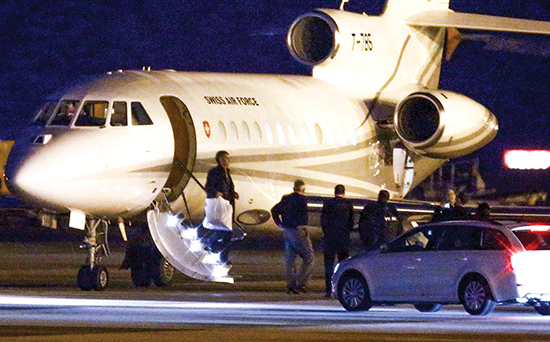The Obama Administration shows weakness in latest hostage negotiations
Earlier this month, President Barack Obama praised American diplomacy as he announced an agreement with Iran to release Americans in what was labeled by the media as a “prisoner swap.” Among the prisoners released was Pastor Saeed Abedini, who was arrested in September 2012, according to the Huffington Post.
This swap has been a long time coming for the families of the Americans held in Iran, but the conditions of the swap leave little to be desired. America gave far too much.
The New York Times reported four Americans were released in the swap, with three choosing to return to the U.S. Another American was also released, but not as part of the swap, according to Reuters.
On the Iranian side, however, seven prisoners were released, one Iranian and six with dual Iran and U.S. citizenship. This was in addition to the U.S. dropping charges against 14 other Iranians as well as lifting some “international economic sanctions,” according to CNN.
All in all, the Iranians received 21 prisoners essentially set free, while the U.S. had to beg and grovel for four Americans in hopes of better relations with the country. This deal does not seem to balance out on both ends.
Obama referred to the deal as a “one-time gesture,” according to The New York Times, and praised American diplomacy for the completions of the deal.
“This is a good day because once again we are seeing what’s possible through strong American diplomacy,” Obama said at the White House.
The president also announced during White House remarks Jan. 17 that the U.S. had agreed to pay Iran $400 million in “payments for military equipment that the United States sold to the shah of Iran and never delivered when he was overthrown,” according to The New York Times. This also included $1.3 billion in interest that had accumulated over almost 40 years.
While it is important to bring Americans home and keep our people safe, the conditions of the deal could not be justified as they gave an already dangerous power in the Middle East more fuel for the constant fire of hatred and instability growing in an area plagued by militia groups and uncertainty.
These events, which took place over a weekend, were highly tense and long awaited. Last fall a deal was “all but sealed,” according to The New York Times, but fell apart at the 11th hour.
But now, months later, after years of imprisonment for some, these Americans are finally coming home. Now the only
question that remains is, at what cost?
Many Republican leaders have criticized the deal, including Sen. Mark Rubio.
“Governments are taking Americans hostage because they believe they can gain concessions from this government under Barack Obama,” Rubio said. “It’s an incentive for more people to do this in the future.”
Agreeing with Rubio, this deal could liken the possibility of more kidnappings or unlawful imprisonments of American citizens abroad. Our government has clearly shown it is willing to go to great lengths to get the Americans back, which it should, so long as it does not put other Americans or the stability of an area of the world in danger.
Gov. Chris Christie, who is currently vying for the Republican bid for president, also criticized the deal and brought up the legality of the Americans’ arrests in the first place.
“We shouldn’t have to swap prisoners, these folks were taken illegally in violation of international law and they should have been released without condition,” Christie said.
This deal, which gives power to an already dangerous nation, released over five times as many prisoners back to Iran, who were lawfully incarcerated, as America gained in return. The ends in this case do not justify the means as most of the accusations against the Americans imprisoned were suspicious to begin with.
America showed a great weakness that weekend, and while I am happy the Americans are home, I worry about the lengths the Obama Administration will go to — and the amount of resources it will freely give to — dangerous countries.
